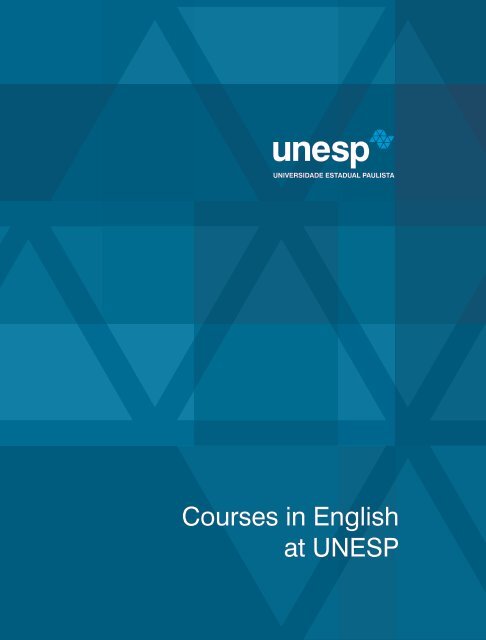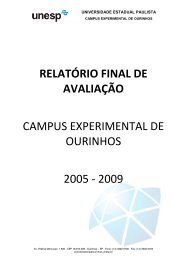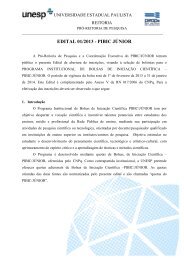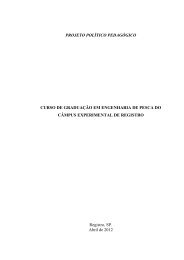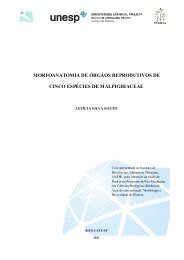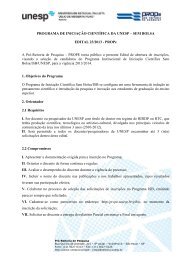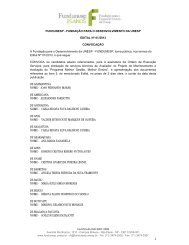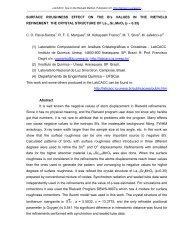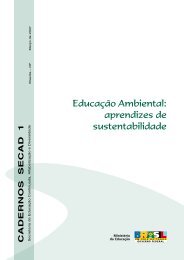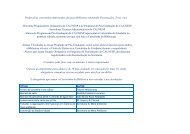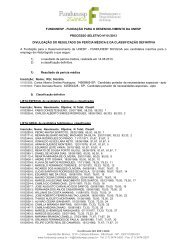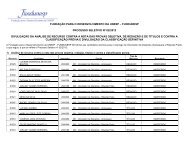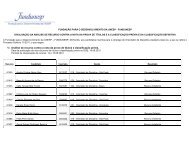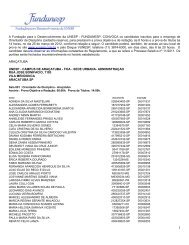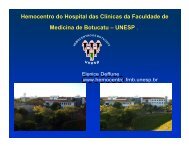Courses in English at UNESP
Courses in English at UNESP
Courses in English at UNESP
Create successful ePaper yourself
Turn your PDF publications into a flip-book with our unique Google optimized e-Paper software.
<strong>Courses</strong> <strong>in</strong> <strong>English</strong><br />
<strong>at</strong> <strong>UNESP</strong>
<strong>Courses</strong> <strong>in</strong> <strong>English</strong><br />
<strong>at</strong> <strong>UNESP</strong>
Universidade Estadual Paulista – <strong>UNESP</strong> is a public<br />
university with 23 campuses spread throughout the<br />
st<strong>at</strong>e of São Paulo, a major economic power <strong>in</strong> Brazil.<br />
<strong>UNESP</strong> is a research university, ranked among the best<br />
<strong>in</strong> the country receiv<strong>in</strong>g <strong>in</strong>tern<strong>at</strong>ional recognition for the<br />
quality of its research and academic activities.<br />
In order to raise the number of <strong>in</strong>tern<strong>at</strong>ional students <strong>in</strong> our<br />
programs, the university is launch<strong>in</strong>g a new project called <strong>English</strong><br />
Programs <strong>at</strong> <strong>UNESP</strong> – EPU, approach<strong>in</strong>g five different areas:<br />
Agriculture Sciences, Altern<strong>at</strong>ive Energy, Biodiversity, Dentistry as<br />
well Liter<strong>at</strong>ure and L<strong>in</strong>guistics. Each one of these programs will have<br />
a group of discipl<strong>in</strong>es arranged accord<strong>in</strong>g the ECTS (European<br />
Credit Transfer and Accumul<strong>at</strong>ion System), th<strong>at</strong> will sum a total<br />
of 120 ECTS credits and will be bounded to different gradu<strong>at</strong>e<br />
programs of <strong>UNESP</strong>.<br />
Foreign students from undergradu<strong>at</strong>e or gradu<strong>at</strong>e programs should<br />
be <strong>at</strong> Unesp for a m<strong>in</strong>imum period of one semester and maximum<br />
of four. They will have the possibility of develop<strong>in</strong>g a traditional<br />
exchange period, or stay <strong>at</strong> <strong>UNESP</strong> after f<strong>in</strong>ish<strong>in</strong>g their <strong>in</strong>itial period,<br />
bounded to a gradu<strong>at</strong>e program <strong>in</strong> order to f<strong>in</strong>ish their studies and<br />
receive a master degree from <strong>UNESP</strong>. In case of PhD students, they<br />
will be able to keep develop<strong>in</strong>g their research, with a co-tutor, if they<br />
are <strong>in</strong>terested.<br />
Foreign students th<strong>at</strong> will <strong>at</strong>tend the programs should enroll <strong>in</strong> an<br />
<strong>in</strong>tensive Portuguese as a Second Language program th<strong>at</strong> will be<br />
offered by <strong>UNESP</strong>.<br />
<strong>UNESP</strong> will offer annually, for each of the five programs, two master<br />
scholarships with dur<strong>at</strong>ion of two years and a one year doctor<strong>at</strong>e<br />
scholarship with the values currently used by the fund<strong>in</strong>g agencies<br />
<strong>in</strong> Brazil. Students should declare their <strong>in</strong>terest for this scholarship <strong>at</strong><br />
the moment of their applic<strong>at</strong>ion.<br />
Each one of the five programs will count with f<strong>in</strong>ancial resources to<br />
<strong>in</strong>vite annually a foreign professor to particip<strong>at</strong>e <strong>in</strong> the program. He<br />
will have the opportunity of giv<strong>in</strong>g classes for a maximum period of<br />
two months <strong>in</strong> one of the programs <strong>in</strong> order to develop activities with<br />
<strong>UNESP</strong> researchers.<br />
3
Agricultural Sciences<br />
Brazil is one of the largest gra<strong>in</strong> and<br />
me<strong>at</strong> produc<strong>in</strong>g countries <strong>in</strong> the<br />
world. Thus, the discipl<strong>in</strong>es offered<br />
aim <strong>at</strong> engag<strong>in</strong>g students <strong>in</strong> several<br />
aspects rel<strong>at</strong>ed to susta<strong>in</strong>able<br />
agricultural and animal production<br />
<strong>in</strong> the tropics. Students will have<br />
also the opportunity of study<strong>in</strong>g <strong>in</strong><br />
different <strong>UNESP</strong> campuses and,<br />
therefore, ga<strong>in</strong> knowledge on different<br />
production and research approaches<br />
<strong>in</strong> agricultural sciences <strong>in</strong> Brazil.<br />
Discipl<strong>in</strong>es of the program<br />
• Biological Evalu<strong>at</strong>ion Of Feeds<br />
And Nutritional Requirements For<br />
Rum<strong>in</strong>ants<br />
• Breed<strong>in</strong>g Autogamous Crops<br />
• Dairy Science And Technology<br />
• Ecophysiology Of Bioenergy Crops<br />
• Eng<strong>in</strong>eer<strong>in</strong>g Properties Of Food<br />
M<strong>at</strong>erials<br />
• Evolution Of Plant P<strong>at</strong>hogens In<br />
Agriculture<br />
• Fish Larviculture<br />
• Measur<strong>in</strong>g Susta<strong>in</strong>ability In Agricultural<br />
Systems<br />
• Observ<strong>in</strong>g And Measur<strong>in</strong>g Animal<br />
Behaviour<br />
• Optimiz<strong>in</strong>g Applic<strong>at</strong>ion And<br />
Environmental Dynamics Of Pesticides<br />
• Professional Development And<br />
Scientific Ethics<br />
• Seed Biology And Physiology<br />
• Topics On Agriculture And<br />
Development<br />
• Understand<strong>in</strong>g Genes, Genetics And<br />
Genomics: New W<strong>in</strong>dows Opened In<br />
Agricultural Sciences<br />
Coord<strong>in</strong><strong>at</strong>or<br />
Odair A. Fernandes<br />
oafernandes@fcav.unesp.br<br />
5
Altern<strong>at</strong>ive Energy<br />
This theme wil br<strong>in</strong>g the most upd<strong>at</strong>ed<br />
and relevant issues regard<strong>in</strong>g<br />
Brazilian research <strong>in</strong> energy obta<strong>in</strong>ed<br />
by biomass and other renewable<br />
sources. Choos<strong>in</strong>g this theme,<br />
the students will study topics like<br />
technological development rel<strong>at</strong>ed<br />
to energy storage by us<strong>in</strong>g smart<br />
m<strong>at</strong>erials, autom<strong>at</strong>ion and control of<br />
power systems, efficiency <strong>in</strong> energy<br />
use, technological <strong>in</strong>nov<strong>at</strong>ion for<br />
altern<strong>at</strong>ive energies, with special<br />
<strong>at</strong>tention to those th<strong>at</strong> demonstr<strong>at</strong>e<br />
gre<strong>at</strong>er environmental susta<strong>in</strong>ability.<br />
Discipl<strong>in</strong>es of the program<br />
• The Brazilian Electrical Power System:<br />
Opportunities For Energy Conserv<strong>at</strong>ion<br />
• Design Of Experiments And Robust<br />
Design Applied To Renewable<br />
• Efficient Use Of Energy<br />
• Electric Mach<strong>in</strong>es Control<br />
• Electric Power Quality In Distribution<br />
Networks With Renewable Energy<br />
• Fuel Cells<br />
• Geotechnologies Applied To Energy<br />
Management<br />
• Renewable Energy And Electric Power<br />
Gener<strong>at</strong>ion<br />
• Renewable Energy In Microgrids<br />
• Technology Of Process<strong>in</strong>g Agricultural<br />
And Forestry Biomass<br />
• Thermal Systems Optimiz<strong>at</strong>ion<br />
• Utiliz<strong>at</strong>ion Of Agriwastes For The<br />
Production Of Energy And New<br />
M<strong>at</strong>erials<br />
Coord<strong>in</strong><strong>at</strong>or<br />
José Luz Silveira<br />
joseluz@feg.unesp.br<br />
6
Biodiversity<br />
This theme is extremely relevant and<br />
will enable students to engage <strong>in</strong><br />
studies of the most biodiverse coutry<br />
<strong>in</strong> the world. With the courses <strong>in</strong> this<br />
theme, the students will have contact<br />
with topics l<strong>in</strong>ked to research on<br />
biomass and bioenergy production,<br />
production and analysis of biofuels,<br />
automotive eng<strong>in</strong>e applic<strong>at</strong>ions,<br />
economics and social and<br />
environmental impacts of biofuels.<br />
Discipl<strong>in</strong>es of the program<br />
• Bioc<strong>at</strong>alysis<br />
• Ethnobotanic And Conserv<strong>at</strong>ion Of The<br />
Vegetal Biodiversity<br />
• Methods In Microbial Ecology<br />
• Photosynthesis, Agronomic Productivity<br />
And Ecophysiology Of N<strong>at</strong>ive And<br />
Cultiv<strong>at</strong>ed Tropical Plant Species<br />
• Pr<strong>in</strong>ciples Of Phylogenetic System<strong>at</strong>ics<br />
• Stress And Immunity<br />
• Susta<strong>in</strong>able Exploit<strong>at</strong>ion Of Biodiversity<br />
• The Invisible Beauty Of Biodiversity<br />
Coord<strong>in</strong><strong>at</strong>or<br />
Wagner Vilegas<br />
vilegasw@clp.unesp.br<br />
7
Dentistry<br />
Brazilian dentistry is considered one<br />
of the most advanced <strong>in</strong> the world.<br />
This group of discipl<strong>in</strong>es will br<strong>in</strong>g<br />
together cl<strong>in</strong>ical and basic science to<br />
address the concepts of dental caries<br />
and other oral <strong>in</strong>fections and their<br />
consequences for understand<strong>in</strong>g the<br />
diseases, the biocomp<strong>at</strong>ibility and<br />
cl<strong>in</strong>ical applic<strong>at</strong>ions of restor<strong>at</strong>ive<br />
m<strong>at</strong>erials and the pr<strong>in</strong>ciples of bone<br />
biology. Upon completion of this<br />
theme, it is expected th<strong>at</strong> the students<br />
will apply the knowledge learned to<br />
the solution of a wide range of oral<br />
diseases.<br />
Discipl<strong>in</strong>es of the program<br />
• Basic And Cl<strong>in</strong>ical Research In Endoperiondontal<br />
Lesions<br />
• Biology Of Regul<strong>at</strong>ion Of Bone<br />
Turnover<br />
• Bone Biology Applied To Dentistry<br />
• Cariology<br />
• Cl<strong>in</strong>ical Research In Restor<strong>at</strong>ive<br />
Dentistry<br />
• Cytotoxicity And Biocomp<strong>at</strong>ibility Of<br />
Biom<strong>at</strong>erials Used In Dentistry<br />
• Direct Adhesive Restaur<strong>at</strong>ions<br />
• Integr<strong>at</strong><strong>in</strong>g New Molecular Insights Into<br />
Cl<strong>in</strong>ical Aspects Of Hostmicrobial In<br />
Infectious Oral Diseases<br />
• Pulp And Perialpical Tre<strong>at</strong>ment<br />
(Endodontics)<br />
• Science Of Bond<strong>in</strong>g In Restor<strong>at</strong>ive<br />
Dentistry<br />
Coord<strong>in</strong><strong>at</strong>or<br />
Carlos Eduardo Vergani<br />
vergani@foar.unesp.br<br />
8
Liter<strong>at</strong>ure and L<strong>in</strong>guistiCS<br />
This Program aims <strong>at</strong> explor<strong>in</strong>g a<br />
wide range of topics <strong>in</strong> Portuguese<br />
Language, Brazilian Liter<strong>at</strong>ure,<br />
Liter<strong>at</strong>ures <strong>in</strong> <strong>English</strong>, Compar<strong>at</strong>ive<br />
Liter<strong>at</strong>ure, Transl<strong>at</strong>ion Studies,<br />
Cultural Studies. The courses will<br />
focus on issues such as discursive<br />
and textual structure of Portuguese<br />
Language, genre, teach<strong>in</strong>g/learn<strong>in</strong>g<br />
languages, literary theory, transl<strong>at</strong>ion<br />
theory.<br />
Discipl<strong>in</strong>es of the program<br />
• Elizabeth Bishop: Brazil Through The<br />
Eyes Of An American Poet<br />
• The Fiction Genre Of Parable<br />
• Introduction To Gradu<strong>at</strong>e Studies In<br />
Compar<strong>at</strong>ive Liter<strong>at</strong>ure<br />
• An Introduction To Modern<br />
Hermeneutics: Philological And Literary<br />
Interpret<strong>at</strong>ion<br />
• Language Awareness And Implic<strong>at</strong>ions<br />
For Teach<strong>in</strong>g, Learn<strong>in</strong>g And<br />
Instructional Interaction<br />
• Language Policy<br />
• L<strong>in</strong>guistic Elements To The Liter<strong>at</strong>y Text<br />
• The Literary Reception Of Walt Whitman<br />
In Brazil<br />
• Liter<strong>at</strong>ure And History<br />
• Liter<strong>at</strong>ure In Early Childhood<br />
• Perspectives On Typology<br />
• Postmodernism And Cultural Studies<br />
• Pr<strong>in</strong>ciples For Scientific Research<br />
Methodology<br />
• Read<strong>in</strong>g Brazil Through Liter<strong>at</strong>ure<br />
• Read<strong>in</strong>g Three Novels: The Mill On The<br />
Floss By Geoge Eliot, The Voyage Out<br />
By Virg<strong>in</strong>ia Woolf And Near To The Wild<br />
Heart [Perto Do Coração Selvagem] By<br />
Clarice Lispector<br />
• Sem<strong>in</strong>ars In Academic <strong>English</strong>: Giv<strong>in</strong>g<br />
Present<strong>at</strong>ions<br />
• Spoken Language: Research<br />
Perspectives And Pr<strong>in</strong>ciples In Foreign<br />
Language Learn<strong>in</strong>g And Teach<strong>in</strong>g<br />
• The The<strong>at</strong>re: Theory And Practice<br />
• Transl<strong>at</strong>ion Theory And Research<br />
Methods In Transl<strong>at</strong>ion Studies<br />
Coord<strong>in</strong><strong>at</strong>or<br />
Giséle Manganelli Fernandes<br />
gisele@ibilce.unesp.br<br />
9
In all these topics <strong>UNESP</strong> has a high level of scientific competence.<br />
The courses will be form<strong>at</strong>ted observ<strong>in</strong>g strict academic criteria<br />
for full recognition of credits obta<strong>in</strong>ed <strong>at</strong> <strong>UNESP</strong>. Standard<br />
requirements set by the European Commission for academic<br />
recognition of study periods abroad European Credit Transfer<br />
System – ECTS will be considered.<br />
CEU will accept undergradu<strong>at</strong>e, master’s and PhD students. All<br />
students must register to <strong>at</strong>tend courses <strong>in</strong> a s<strong>in</strong>gle theme and<br />
may use the courses as part of their academic exchange program.<br />
Dur<strong>in</strong>g their stay <strong>in</strong> Brazil, <strong>UNESP</strong> will offer a course of Portuguese<br />
as a foreign language to enable better <strong>in</strong>tegr<strong>at</strong>ion.<br />
In addition, foreign students who wish to <strong>at</strong>tend a regular master<br />
course <strong>at</strong> <strong>UNESP</strong> will be eligible for scholarships provided by the<br />
program. In this case, these students need to stay for <strong>at</strong> least a<br />
year and a half tak<strong>in</strong>g courses <strong>in</strong> <strong>English</strong> as well as mand<strong>at</strong>ory<br />
courses from the regular gradu<strong>at</strong>e programs. PhD students who<br />
wish to <strong>at</strong>tend the courses <strong>in</strong> <strong>English</strong> language could also apply for<br />
scholarships and start jo<strong>in</strong>t research with Unesp faculty members.<br />
These students will be registered <strong>in</strong> our regular gradu<strong>at</strong>e programs.<br />
<strong>UNESP</strong> like all public universities <strong>in</strong> Brazil does not charge tuition<br />
and other fees of their students and foreign students particip<strong>at</strong><strong>in</strong>g <strong>in</strong><br />
our courses are exempted as well.<br />
10
Why Choose Brazil and São Paulo St<strong>at</strong>e for an Academic Exchange<br />
Go<strong>in</strong>g through a special moment <strong>in</strong> its history of economic, <strong>in</strong>stitutional and social<br />
development Brazil is the second economy <strong>in</strong> the Americas, only beh<strong>in</strong>d the United St<strong>at</strong>es<br />
and positioned among the seven largest world economies.<br />
The Brazilian economy is established <strong>in</strong> a rich and competitive market. The discoveries made<br />
<strong>in</strong> the Pre-Salt raised the country to a new oil reserve and production level, to a position of<br />
prom<strong>in</strong>ence <strong>in</strong> the world. Agriculture, m<strong>in</strong><strong>in</strong>g, manufactur<strong>in</strong>g (automobiles, aircrafts, electrical<br />
and electronic equipment, textile/apparel, etc.), large sized trade and product distribution<br />
networks, <strong>in</strong> addition to the services sector, provide excellent growth opportunities for<br />
entrepreneurs, as well as for tra<strong>in</strong>ed and enthusiastic professionals.<br />
Students choos<strong>in</strong>g Brazilian universities to develop their academic educ<strong>at</strong>ion will f<strong>in</strong>d<br />
undergradu<strong>at</strong>e and gradu<strong>at</strong>e level excellence centers, besides relevant areas to develop<br />
globally recognized researches and public outreach centers of major relevance. Above all,<br />
these students will be able to enjoy the decanted courtesy of Brazilian people to theirs visitors,<br />
the n<strong>at</strong>ural ability to make friends and the opportunity to become partners <strong>in</strong> the journey of<br />
transform<strong>in</strong>g Brazil, <strong>in</strong> the next ten years, <strong>in</strong>to one of the top five economies on the planet.<br />
The economy of the st<strong>at</strong>e of São Paulo is the most developed and powerful <strong>in</strong> Brazil,<br />
record<strong>in</strong>g 33.9% of the total Brazilian GDP. There are 645 cities, distributed <strong>in</strong> almost 250<br />
thousand square kilometers – area slightly larger than the United K<strong>in</strong>gdom – where there<br />
are over 41 million <strong>in</strong>habitants. The region around its st<strong>at</strong>e capital, the city of São Paulo, is<br />
considered the sixth largest urban agglomer<strong>at</strong>ion <strong>in</strong> the world, compris<strong>in</strong>g about 20 million<br />
<strong>in</strong>habitants. Its popul<strong>at</strong>ion is the most diverse of the country. Initially dom<strong>in</strong><strong>at</strong>ed by the<br />
Portuguese discoverers, São Paulo received people from Africa, reta<strong>in</strong>ed the Amer<strong>in</strong>dians<br />
and from the mid-1800 received Italian, Arab, Japanese, Spanish, German, Jew and more<br />
recently, Korean and Ch<strong>in</strong>ese immigrants. Thus, it became a cosmopolitanism model: <strong>in</strong><br />
the capital of the st<strong>at</strong>e of São Paulo, immigrants and their descendants live and work <strong>in</strong><br />
complete harmony. Be<strong>in</strong>g the most developed st<strong>at</strong>e <strong>in</strong> Brazil, São Paulo is the ma<strong>in</strong> center of<br />
the Mercosur economy. The major n<strong>at</strong>ional and mult<strong>in</strong><strong>at</strong>ional economic groups concern<strong>in</strong>g<br />
<strong>in</strong>dustrial companies, farm<strong>in</strong>g and services are <strong>in</strong>stalled <strong>in</strong> modern build<strong>in</strong>gs th<strong>at</strong> represent<br />
the advanced Brazilian architecture <strong>in</strong> one of the fastest grow<strong>in</strong>g cities <strong>in</strong> the world. The st<strong>at</strong>e<br />
also concentr<strong>at</strong>es the most important portion of the ethanol fuel <strong>in</strong>dustry <strong>in</strong> the country.<br />
11
AREX<br />
Assessoria de Relações Externas<br />
PROPG<br />
PRÓ-REITORIA DE PÓS-GRADUAÇÃO<br />
Sao Paulo St<strong>at</strong>e University | <strong>UNESP</strong><br />
Intern<strong>at</strong>ional Office<br />
Rua Quir<strong>in</strong>o de Andrade, 215 - Centro<br />
São Paulo, SP, Brasil | 01049-010<br />
http://www.unesp.br/en


